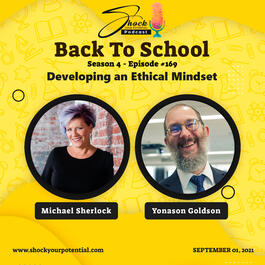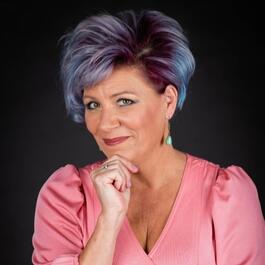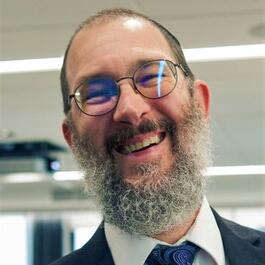
Developing an Ethical Mindset - Yonason Goldson
"Instead of seeing differences as a source of contention, we should see an opportunity for great partnerships between people who are very different from one another." Rabbi Yonason Goldson Whether written or not, the framework of ethics that underlies our existence remains a key determinant of the quality of lives that we live. It helps us make decisions that create desirable outcomes and steers us away from unjust outcomes. Our gust today, Rabbi Yonason Goldson, advocates for a culture of ethics at all levels and says that it all starts from understanding and defining what ethics means to us. Yonason Goldson, director of Ethical Imperatives, LLC, works with leaders to create a culture of ethics that builds trust, sparks initiative, and drives productivity. He's a keynote and TEDx speaker, trainer, coach, and community rabbi, as well as a columnist and author, repentant hitchhiker, world traveler, and retired high school teacher in St. Louis. He has published hundreds of articles applying ancient rabbinic wisdom to the challenges of the modern secular world and six books, most recently "Grappling with the Gray: an ethical handbook for personal success and business prosperity." In today's episode, our guest will talk about ethics and its role in having functional relationships at all levels. He will also give insights into the ethical qualities that a leader needs to cultivate for better outcomes. Listen in! Social Media https://www.yonasongoldson.com/ https://www.linkedin.com/in/yonason-goldson/ https://www.youtube.com/c/yonasongoldson https://www.facebook.com/yonasongoldson/ https://twitter.com/yonasongoldson https://www.instagram.com/yonasongoldson/ https://www.tiktok.com/@yonasongoldson When we go into business, we're often very focused on what we want, or if we're a little more sophisticated, what we provide, but what we should also be thinking about is with whom we are dealing. [3:04] Relationships are the foundation of all success in our personal lives, professional lives, and [3:17] When we consider ethics, one of the problems we have is that we don't have a good definition of ethics, which means we don't know how we can be ethical people. [3:30] What I've come up with is that ethics is the discipline of recognizing and taking responsibility for the impact our actions have on other people. [3:42] In order to have that recognition and take that responsibility, we have to have a sense of who other people are, show them that we are trustworthy, and show that we are willing to trust them. [3:53] Instead of seeing differences as a source of contention, we should see an opportunity for great partnerships between people who are very different from one another. [4:32] If we're both good at the same thing, that means at least one of us is wasting our effort. [4:48] Ethics is not nearly as much about what is the right thing to do but about contemplating what the right thing to do is. It is priorities, competing values, sensitivity to the spirit of the law, and not just the letter of the law. [5:18] When we develop our ethical mindset, that's what enables us to approach all our relationships and decisions in an ethical way, which ultimately drives the greatest possible success in everything we do. [5:46] We emphasize compliance, but it can become the enemy of ethics because if I relegate my decision-making to a code of rules, I don't have to think about whether it's really the right thing to do. [6:40] When I finished college, I went backpacking across Europe and ended up in Israel. I had been raised with really no knowledge of what it meant to be Jewish. [7:10] I was astonished to discover this vibrant culture of deep meaning, purpose, thought, and values, which changed the trajectory of my life. [7:20] I bring that ancient wisdom into the modern secular world and show how the answers are all there; we have to update the language a little bit so that we can recognize how it applies to us and how it guides us regardless of our religious identity or affiliation. [7:33] Jim Rohn famously says you are the average of the five people you spend the most time with, and it's not just the friends. It is also what we consume in media. [9:00] When traveling through Europe, I was on a train from Luxembourg to Cologne, Germany, and I shared a car with a German journalist and invited me into his home. [11:20] To meet someone from that culture and learn about him as an individual, not as a label, is a memory that I've kept with me for 40 years. [11:55] In my book, I used a formula that I use in much of my training, presenting ethical dilemmas of not trying to say it is right or wrong but trying to understand an issue from both sides and finding a middle way. [12:55] It is broken up into social, business headlines, education, and the different areas of life where we have to grapple with the gray areas to make ethical decisions. [11:33] Commercial break. [14:03] It is all about taking responsibility for ourselves, recognizing the mistakes we've made, the areas where we could and should improve, and making a plan for moving forward. [15:30] We know what we should do and what we want to do, but we don't plan how to put it into practice. [16:00] My approach is, if we focus on our mindset and the behaviors will start to follow. [16:22] I use ethics as an acronym to give characteristics that describe ethical leaders and ethical people. [16:32] E is for empathy which entails knowing other people and being sensitive to them by understanding how our actions affect them. [16:45] The T is Trust, where I demonstrate that I'm trustworthy and know that if I'm not willing to trust you, it will be difficult for you to trust me. [16:53] The H is humility which Pastor Rick Warren defines as not thinking less of yourself but thinking of yourself less. [17:08] The I is inquisitiveness or inquiry because leaders need to ask questions and not wait to be told or asked and not be given permission to serve. [18:24] C is for courage because it is often difficult to do the right thing. [18:52] S is self-discipline because building is a process, and when you get to the end, you start over again and keep building. [19:20] This needs continued reinforced where I need to surround myself with people who are committed to ethical values. [20:40] I am not going to get it right all the time, but it is a commitment to do and another opportunity to learn [20:52] I recommend tapping into this eternal, timeless wisdom that we have access to in ancient teachings to fix our culture, fix our company's business, fix our summers, and fix our families and our communities. [24:45] A few basic principles include showing trust to earn trust, telling stories of grappling with ethical challenges to inspire ethical behavior, and showing appreciation by celebrating the successes of others. [24:59] Suppose we employ these simple principles, and learn how to turn these ideas into action. In that case, we can see our relationships improving, our businesses will be more profitable, our families will be more at peace, and our communities will be much more functional. [25:30] …..….……………… Thank you to our January sponsor! KukuaBiz can provide dedicated and affordable talent from Kenya to help you grow and scale your business. Virtual employees are skilled in administrative functions, sales, podcast management, video editing, marketing, social media marketing, website design and management, and more. Learn more: https://www.kukuabiz.com
From "Shock Your Potential"




Comments
Add comment Feedback